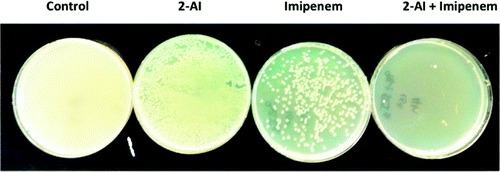A dangerous situation presents itself when bacteria evolve defenses against antibiotics. Experience has shown us that it can be a discouraging catastrophe for public health when a new drug-resistant strain, or a gene that confers resistance, shows up in a new place, as happened when the NDM-1 gene (which is resistant to up to 14 drugs) showed up in New Delhi drinking water. Scientists are searching for a way to defeat that debilitating resistance, however, and every so often there's encouraging news: On February 4, North Carolina State University chemistry researchers published a study in which they said that they’ve found a molecule that makes antibiotics 16 times more effective against recently identified antibiotic-resistant “superbugs.”
NDM-1, which derives its abbreviated name from New Delhi metallo-β-lactamase, is an enzyme produced by bacterial strains that are almost completely invulnerable to antibiotics. The reason for their resistance is NDM-1’s ability to make it impossible for certain antibiotics to bind with the bacteria. Because NDM-1 is present in Gram-negative bacteria like K. pneumoniae, which causes regular infections caught in hospitals such as pneumonia and urinary tract, its resistance to antibiotics is alarming.
Image courtesy ACS Publications
"To begin with, there are fewer antibiotic options for treating infections caused by Gram-negative bacteria than for those caused by Gram-positive bacteria," said Dr. Roberta Worthington, North Carolina State University research assistant professor of chemistry. "Gram-negative bacteria with the NDM-1 enzyme effectively neutralize the few weapons we have in our arsenal, making them especially difficult, if not impossible, to treat with existing antibiotic therapy."
The new compound the NC State chemistry researchers found was discovered by testing around 50 potential molecules to see if they could substantially decrease the number of K. pneumoniae that were carrying NDM-1. On its own, the molecule they identified has no specific antimicrobial properties. Known as an adjuvant, it has to be used with another drug to be effective. The drugs the chemistry researchers applied the molecule to are the antibiotics imipenem and meropenem. As a whole, the compound is 16 times more effective against NDM-1.
NC State chemistry researcher Dr. Christian Melander said: “We've demonstrated that we have the ability to take out the scariest superbug out there. Hopefully further research will allow us to make the compound even more effective, and make these infections little more than a nuisance." With the discovery North Carolina State University researchers have made, the fight against NDM-1 has advanced significantly.Though there is still progress to be made in making the compound more effective, hopes are high that chemistry researchers will continue to make positive steps forward.
Biotechnology Calendar, Inc. is a full-service science research marketing and events-planning company that runs trade shows at top research universities nationwide. If you are a lab supplier or science researcher looking to network with others in your industry at North Carolina State University, consider attending our annual trade show. For more information on other university trade shows across the country, check out our 2012 calendar of events.
Sources: News Medical, ACS Publications, Discover Magazine



